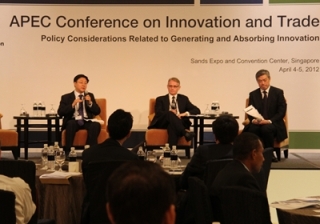 Economies in the Asia-Pacific Economic Cooperation (APEC) region must continue to actively promote “innovation-friendly” policies and infrastructure to bolster their economic fortunes.
Economies in the Asia-Pacific Economic Cooperation (APEC) region must continue to actively promote “innovation-friendly” policies and infrastructure to bolster their economic fortunes.
This was the consensus reached by regional officials and industry leaders who attended the APEC Conference on Innovation and Trade held in Singapore on April 4 to 5, 2012.
“It is important to develop policy environments where ‘innovation actors’ such as private firms, financial institutions including venture capital pools, supporting organizations, and research institutes in APEC economies can act … develop, find, and utilize innovations in an open, free, fair, and transparent trading environment,” said Kenji Goto, Japan’s APEC senior official.
“Under such circumstances, innovative goods, services, business models, and technologies will be produced … which in turn will deepen regional economic integration,” Goto added.
Delegates at the conference also batted for policy adoption and knowledge exchange that promote open, transparent, and fair legal frameworks as well as smart regulation and intellectual property rights protection.
They also highlighted the importance of human resources development and technological, logistical, and social interconnectedness.
John Ure, executive director of the Asia Internet Coalition, an association that promotes open Internet access, pointed to the significance of the Internet’s transformation into a global mode of production, distribution, and consumption.
“The real benefit [of this trend] to the economy and to trade is not growth per se, but the likelihood that growth will be more broadly based—and therefore more sustainable—and more socially inclusive,” Ure said. “Economies that are slow to adapt will be slow to benefit.”
The workshop participants agreed that while the Asia-Pacific region is increasingly open to innovators, there is still plenty of room to enhance innovation-supportive policies among both developed and developing economies.




